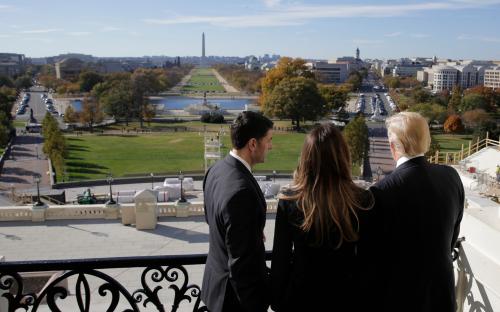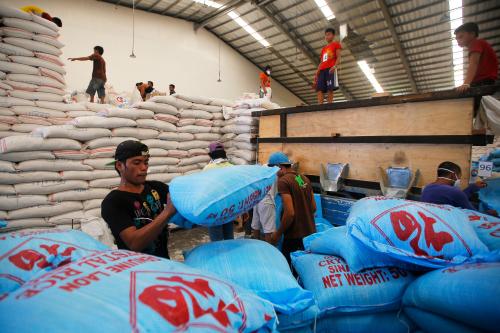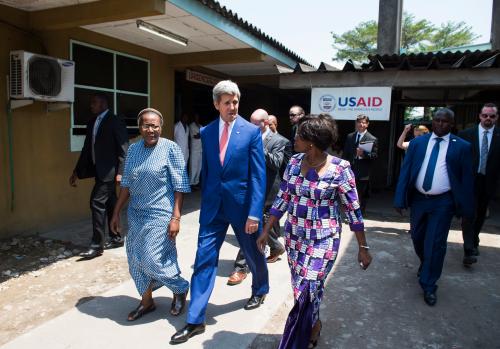Today the Global Development Council presented a first set of practical and valuable recommendations to the president and the public. I can already hear the yawns, and the queries asking for a reminder as to what is this council, which was first proposed as an independent advisory council on development three-and-a-half years ago in the president’s Policy Directive on Development and whose initial members were appointed 16 months ago. But this brief report is worth reading and discussing. It recommends four areas in which the development agenda can move ahead in the next few years. The recommendations are built on administration initiatives and do much to both integrate some of these initiatives and move them a further step along. The report is not comprehensive and does not touch on many elements of development, but does focus attention on four actionable recommendations that can advance the U.S. contribution to development.
The first recommendation is to Harness the Private Sector through modernizing the tools the U.S. government utilizes for development finance. The report endorses the concept of a “one-stop” U.S. Development Finance Bank and separately endorses specific improvements in the authorities and resources of USAID, OPIC, and the international financial institutions. It recommends pragmatic steps that in the last several years have picked up support from diverse sources, including the policy community, business groups and political leaders.
Coming from the policy community, the most far reaching of the council’s recommendations is the formation of a Development Finance Bank, first proposed by Ben Leo and Todd Moss at the Center for Global Development. Recommendations targeted to enhance the capabilities of specific U.S. development finance mechanisms have been advanced by scholars at the Center for American Progress, Council on Foreign Relations, Center for Strategic and International Studies, and the Brookings Institution. From the business community, in addition to the traditional business lobby organizations, a new business coalition, American Leadership in Global Development, has recently been formed to advocate strengthening U.S. development finance tools. And there is burgeoning interest in Congress as well, such as a multi-year authorization of OPIC that is included in HR 2548, the Electrify Africa bill, introduced by Representatives Ed Royce and Eliot Engel and now with 95 House cosponsors.
The most important step the members of the council could take to advance this agenda is to commit to the president, jointly and individually, to see these recommendations through the legislative process, and to offer to serve as the facilitator among the executive branch, business, civil society, and Congress—to work on a bipartisan basis to advance this national interest.
A second set of recommendations joins Innovation, Transparency, and Evidenced-Based Policy. It is particularly encouraging to see the spotlight put on transparency and the U.S. commitment to the International Assistance Transparency Initiative (IATI). Data transparency is an essential tool of accountability, informed evidence-based policy and innovation. The Millennium Challenge Corporation (MCC) has been a positive experiment in the value of bringing transparency to government and a demonstration of how transparency can help an agency stay true to its mission by helping to fend off political and bureaucratic diversions.
The strong U.S. commitment to be fully compliant with IATI by the end of 2015—having all U.S. assistance data posted and of good quality and detail—is commendable but has run into unfortunate delays. Both the Assistance Dashboard and U.S. postings of data to IATI have been inadequate in scope and nature of the data and have yet to reach a level where the data is very useful, especially to developing-country users. There has been recent indications of a renewed commitment to making the data comprehensive and sufficiently detailed so as to be useful, so hopefully the Global Development Council turning the public spotlight on IATI, and indirectly the Foreign Assistance Dashboard, will bring the political leadership, urgency, and resources needed to empower the agency staff responsible for bringing data transparency into fruition.
The council’s report appropriately calls on USAID’s new Global Development Lab to be bolder, more ambitious and tolerate risk. In addition, the council should call on the Lab to embrace transparency as an operational methodology. The Lab gathers into one unit at USAID disparate efforts to bring science and technology and innovation into development, and is intended to integrate and build synergies between the programs. Bringing transparency to the operations of the Lab can further help promote innovation as expanding the knowledge of the activities and programs of the Lab can spark new thinking and experimentation elsewhere that can feed into the Lab.
The transparency agenda also needs to be expanded to government budget and policymaking, as transparency can lead to a better informed public, better informed policies and reduced corruption and favoritism.
There would appear to be conflict between “innovation” and “evidence-based policy.” The first requires risk taking, the second operating from the known and proven. This tension can exist within any single project, but the fact is that in development we are always balancing multiple objectives. Some activities, where there is a history of experience and success, can operate from known certainties and evidence; others that delve into lesser known solutions must tolerate more risk. But even in the latter, rigorous monitoring and evaluation is essential in order to learn and adjust according to the evidence.
The third recommendation is focused on Climate-Smart Food Security. The Global Development Council has very adroitly identified a concrete way to act on the charge of the UN High-Level Panel on the Post-2015 Development Agenda to integrate the sustainability and development agendas into a common strategy. The council’s report makes the connection very simply and clearly, noting that it is the “world’s poorest, particularly women (who will) suffer disproportionately from climate change” and that we must feed “an ever-growing global population without…accelerating climate change and environmental degradation.” The recommendation calls for integrating the Obama administration’s Climate Action Plan and Feed the Future programs and for the U.S. to launch a global initiative to reclaim the 600 million acres of degraded agricultural lands.
The fourth recommendation is for the president in the next 18 months to hold a Conference on Global Development. The purpose is to better educate the American people about the role and successes of development. My first reaction was, “not another conference, it will be a one-time flash that the American people never know about.”
But my second thought was, “Wow, if this could be bottom-up, maybe it could make a difference.” Eighteen months might be just enough time to orchestrate a real grass-roots effort, the results of which could then be disseminated through the networks that were used to feed into the conference.
This would not require the creation of any new organization or networks; they already exist. The U.S. Global Leadership Coalition brings together leading citizens at the state-level to discuss U.S. global engagement and smart power; the World Affairs Council and Organization of International Visitors have affiliates across the country in large and medium-sized cities; Rotary International and other service clubs are in all towns and cities and have various international connections and programs; and student forums populate university and college campuses. The list goes on. With the draw of reaching the ear of the president and influencing the national dialogue, the networks could be mobilized to feed a discussion across the country that would help bring the reality and success and needs of development to the American people and particularly to community leaders and activists. This endeavor could help identify the elements of a bipartisan consensus on the role of development for U.S. national interests. It would be important not to let this dialogue die after the conference but to transmit the results back through the networks to sustain longer-term attention. A model that council member Alan Patricof referenced during the public discussion today is the 1995 White House Conference on Small Business.
The council’s report appropriately recognizes and encourages the U.S. administration’s role in the development of the post-2015 agenda. I would add that the recommended conference on development, and the process suggested here to feed into and out of that conference, could be an important means of engaging the American people on that agenda both during its formulation and afterwards.
It is important to note that there are several imperatives integrated throughout the recommendations. One is the empowerment of women. This is a moral and a practical imperative, as eliminating extreme poverty and advancing sustainable development will not be achieved if half of the world’s population is left on the sidelines; the evidence is overwhelming that investing in women brings substantial economic and social returns. A second is the critical role of transparency and accountability. The third is consistency with the direction of the post-2015 development agenda, of which the council’s report reflects a careful reading.
The report importantly concludes by repeating the critical importance of transparency and accountability, calling on Congress and the Obama administration to work together, and restating the goal of inclusive and sustainable development.
Yes, we have waited a little too long for these recommendations, but let’s recognize their value and work alongside the Global Development Council to see their implementation. The focused and practical recommendations demonstrate the value of bringing knowledgeable and diverse voices to U.S. development policy. The public session today, held before presenting the recommendations to President Obama, was an open and informative exchange and sets a good example for transparency and public dialogue in the work of the council.




Commentary
A Welcome Boost to the US Development Agenda: Recommendations of the Global Development Council
April 14, 2014